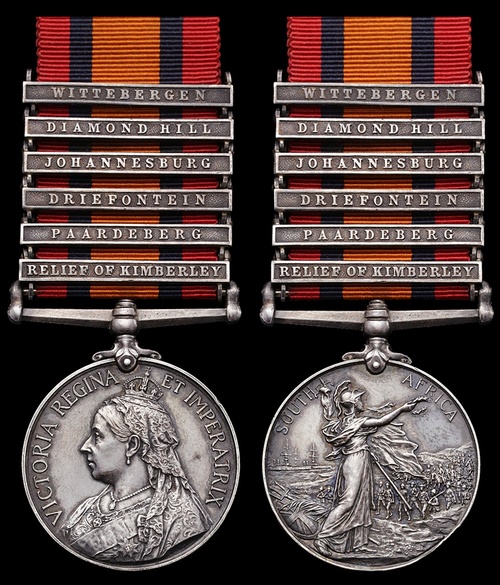
Auction: 20001 - Orders, Decorations and Medals - conducted behind closed doors
Lot: 191
The 6-clasp Queen's South Africa Medal awarded to Gunner J. Palmer, 'Q' Battery, Royal Horse Artillery, who fought in the legendary action at Sanna's Post
Queen's South Africa 1899-1902, 6 clasps, Relief of Kimberley, Paardeberg, Driefontein, Johannesburg, Diamond Hill, Wittebergen (14455 Gnr: J. Palmer, Q.B., R.H.A.), toned, minor edge bruise, nearly extremely fine
Joseph Palmer was baptised at Southwold, Suffolk on 4 November 1877, the son of Joseph and Mary Palmer of 5 St. Edmund's Green, Southwold. After civilian employment as a baker's apprentice, he served in the Suffolk Artillery (a militia unit) before attesting for the Royal Artillery at Great Yarmouth on 5 March 1896, aged 18. He had a pale complexion, hazel eyes, brown hair, and a 'scar on left buttock.' Shortly after enlisting he gained a 3rd Class Certificate of Education (dated 29 April 1896). He transferred to 'Q' Battery, Royal Horse Artillery as a Gunner on 2 February 1897. On 5 March 1898 Palmer was awarded Good Conduct Pay, but two months later he was court-martialled, sentenced to 84 days' imprisonment. He only served half his sentence, and was re-admitted to the service on 20 September 1898. Palmer served in South Africa from 19 December 1899 to 18 May 1901, and is confirmed on the roll as having served with 'B' Sub-Division, 'Q' Battery, Royal Horse Artillery at Sanna's Post on 31 March 1900 (WO100/139).
During this famous V.C.-winning action, 'Q' Battery was part of a 2,000-strong column under General Broadwood which was viciously ambushed by 1,600 Boers under Christiaan de Wet. Armed with accurate Mauser rifles, the Boers employed the cover of a deep spruit created by the Modder River, and were supported by artillery from high ground. They deployed in darkness and surprised the British at first light, capturing over 100 wagons and an artillery piece. Entirely devoid of cover or any realistic opportunity to fight back without being slaughtered, over 200 British troops were forced to surrender in the first few minutes, including six guns of 'U' Battery. The remainder of Broadwood's column faced the almost suicidal return towards the only cover available - a railway station - across 1,300 yards of open ground.
As the British withdrew, the men of 'Q' Battery under Major Phipps-Hornby, supported by a single gun from 'U' Battery and the Mounted Infantry, decided to stand their ground and fight back. For four hours they fought continuously, aided by rifle fire from the railway station, and managed to transform a stampede into an orderly retreat. At that date the guns lacked protective shields, so the gunners were terribly exposed to Boer marksmen. In all, the British suffered 155 men killed or wounded with approximately 430 taken prisoner. For the men of 'Q' Battery, it was a resounding example of bravery and professionalism, resulting in the award of 4 V.C.s and 3 D.C.M.s to the Battery, the former by ballot, there being no fair way to choose four from so many who performed so heroically on that day. This was the fifth case of the application of Clause 13 and the first since the conclusion of the Indian Mutiny.
Palmer was invalided to England as 'medically unfit' on 23 April 1901. Admitted to Ipswich Hospital, he was discharged to pension on 14 March 1902, his conduct described as 'good'; sold with copied service papers and clasp confirmation.
Subject to 20% VAT on Buyer’s Premium. For more information please view Terms and Conditions for Buyers.
Sold for
£750
Starting price
£420




